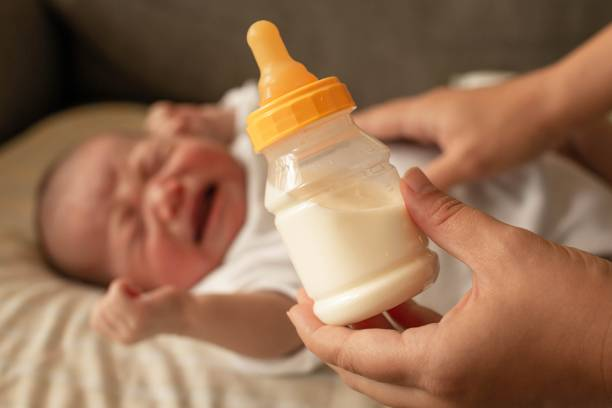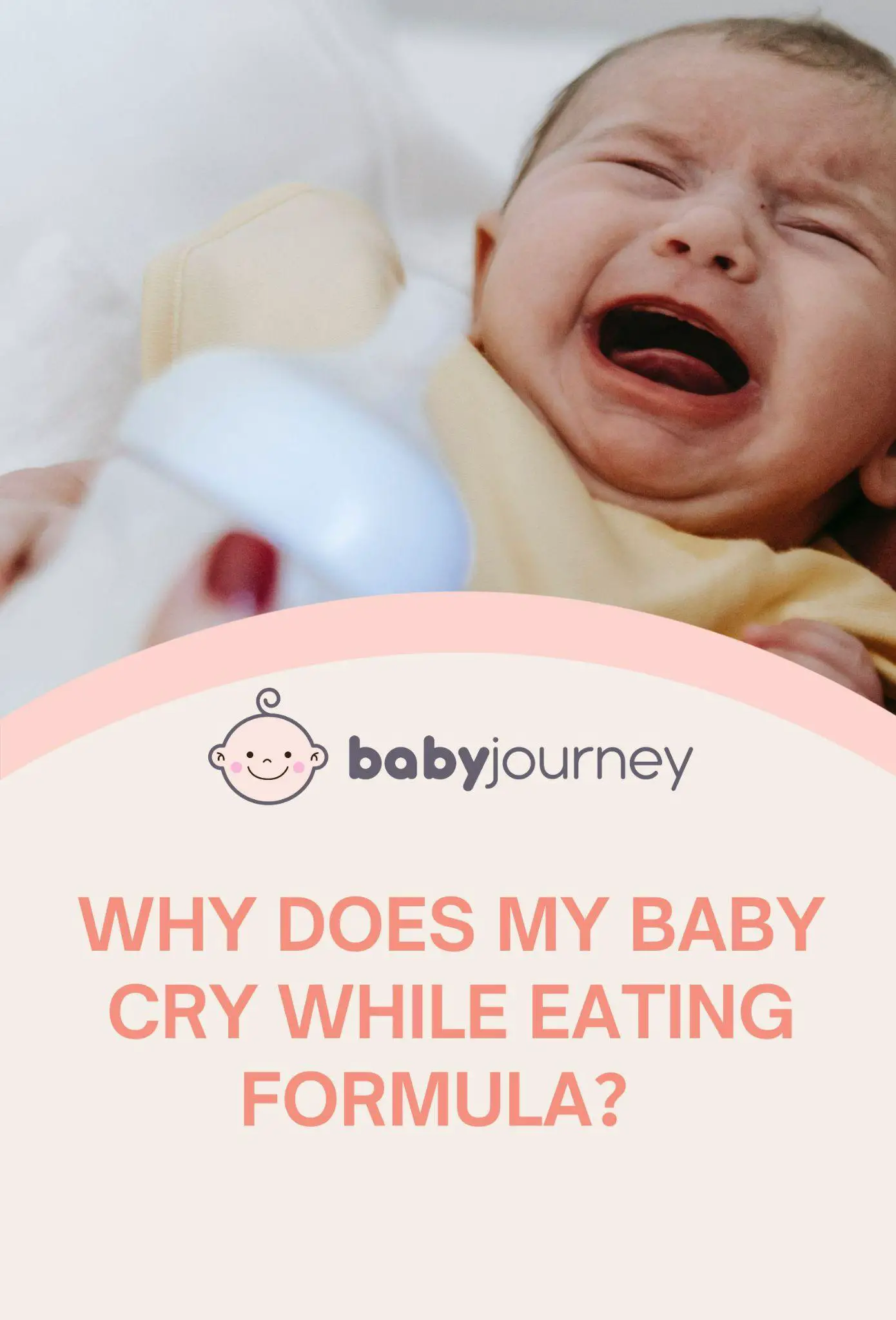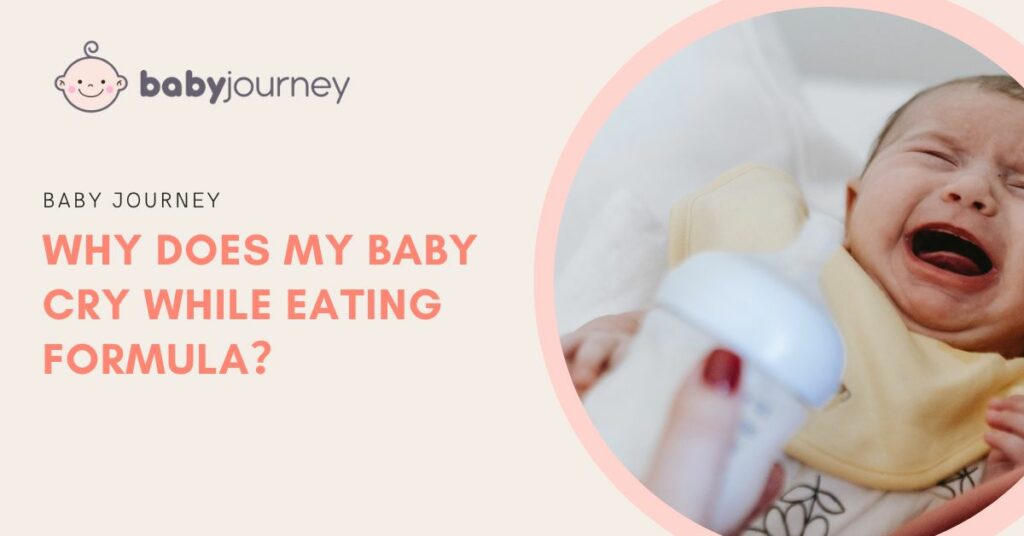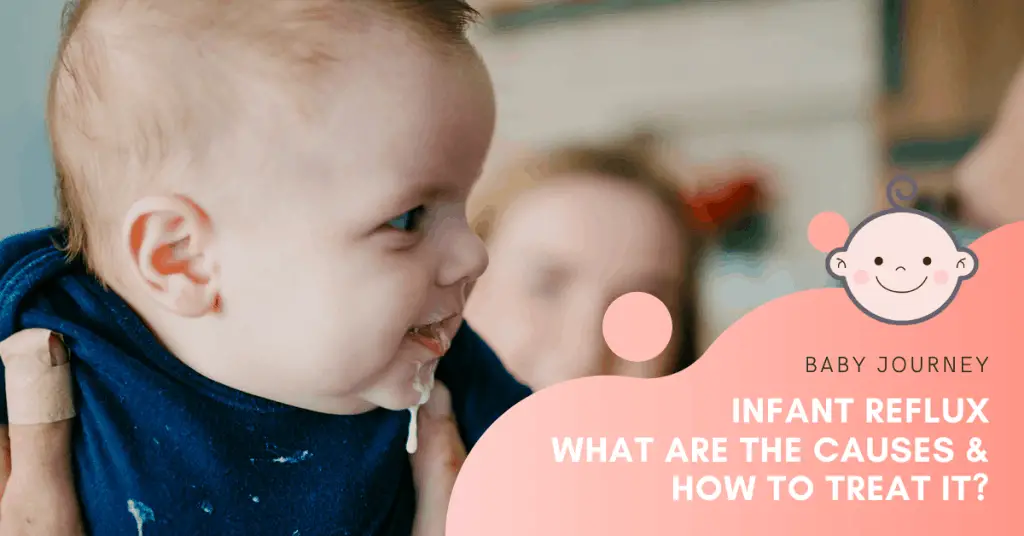Why is my baby crying while feeding formula? Babies cry for many reasons, and one of the most common causes is feeding issues. If your baby is crying while eating formula, it can be distressing for both you and your little one. While some crying during feeding is normal, excessive crying can be a sign of an underlying problem.
Understanding why babies cry while eating formula can be challenging, but there are several potential causes to consider. These can range from discomfort due to an improper nipple size or milk flow, to more serious health concerns and conditions such as reflux or a milk-protein allergy. Behavioral factors such as overfeeding and tiredness can also contribute to feeding difficulties.
- Key Takeaways
- Bottle-Feeding Problems
- Breastfeeding Challenges
- Digestive Discomfort
- Reflux and GERD
- Teething
- Allergies and Intolerances
- Infections
- Burping
- Smaller Amounts and Feeding Schedule
- Upright Position
- Colic Symptoms
- Attention and Exercise
- Why does my baby squirm and cry while bottle feeding?
- How can I tell if my baby isn't agreeing with formula?
- What are some reasons my baby might cry during bottle feeding?
- Why does my baby take a few sips then cry during feeding?
- What can I do if my 1 month old is fussy during bottle feeding?
- Why does my 3 month old cry during bottle feeding?
Key Takeaways
- There are many potential reasons why a baby may cry while eating formula, ranging from discomfort to health concerns.
- Understanding the underlying cause of feeding difficulties is important to help soothe a crying baby.
- If a baby’s crying during feeding persists or is accompanied by other symptoms, it may be time to seek professional help.
Understanding Why Babies Cry

Babies cry for various reasons, and it is their primary means of communication. Crying is their way of telling their parents or caregivers that they need something, whether it is food, a diaper change, or comfort. It is essential to understand that crying is a normal part of a baby’s development and does not necessarily mean that something is wrong.
One of the most common reasons why babies cry while eating formula is that they are experiencing discomfort. They may be experiencing gas, constipation, or reflux, which can cause pain and discomfort while feeding. It is essential to ensure that the baby is in a comfortable position and that the formula is at the right temperature. A baby who is too hot or too cold may also cry while feeding.
Another reason why babies cry while drinking breast milk or eating formula is that they are overfed or underfed. Overfeeding can cause discomfort and may lead to spitting up or vomiting. Underfeeding can cause hunger, leading to crying during and after feeding. It is essential to follow the baby’s feeding cues and not force them to finish a bottle if they are full.
Stress and attention can also cause a baby to cry while feeding. Babies are sensitive to their environment and may become overstimulated or overwhelmed, making it difficult for them to focus on feeding. They may also cry if they feel neglected or ignored. It is essential to provide a calm and quiet environment during feeding and to give the baby the attention they need.
In conclusion, understanding why babies cry while eating formula is essential for parents and caregivers. It is crucial to address the underlying issue to ensure that the baby is comfortable and well-fed. By providing a comfortable and nurturing environment, parents can help their baby feel secure and happy during feeding.
Feeding Issues and Discomfort

Babies crying while eating formula is a common problem that many parents face. There are several reasons why a baby may cry during feeding, including bottle-feeding problems, breastfeeding challenges, and digestive discomfort.
Bottle-Feeding Problems
Bottle-feeding problems can occur due to a variety of reasons. If the baby is not getting enough milk, they may become fussy while bottle-feeding. This can be due to a slow flow of milk or an oversupply of milk. It is important to find the right balance between the two to ensure that the baby is getting the right amount of milk.
Another common problem is that the baby may need to be burped. Babies can swallow air while feeding, which can cause discomfort and crying. It is important to burp the baby after every feeding to prevent this from happening.
Breastfeeding Challenges
Breastfeeding can also present challenges that can cause a baby to cry during feeding. One of the most common challenges is when the baby is not latching properly. This can cause the baby to not get enough milk, which can lead to crying. It is important to seek help from a lactation consultant if this is the case.
Another challenge is when the mother has an oversupply of milk. This can cause the baby to become fussy while breastfeeding. It is important to find ways to regulate the flow of milk, such as pumping before feeding or using a nipple shield.
Digestive Discomfort
Digestive discomfort can also cause a baby to cry during feeding. This can be due to a variety of reasons, including formula intolerance or a digestive problem. If the baby is crying after feeding, it is important to look for signs of digestive discomfort, such as vomiting or diarrhea.
It is also important to establish a feeding schedule to ensure that the baby is getting enough food. A baby that is not getting enough food may become fussy during feeding. It is recommended to feed the baby every 2-3 hours, or as directed by a pediatrician.
In conclusion, there are several reasons why a baby may cry during feeding. It is important to identify the cause of the problem and find a solution that works for both the baby and the parent. Seeking help from a pediatrician or lactation consultant can also be beneficial in addressing feeding issues and discomfort.
Health Concerns and Conditions

There are several health concerns and conditions that can cause a baby to cry while eating formula. Here are some of the most common ones:
Reflux and GERD
Reflux occurs when the contents of the stomach flow back into the esophagus, causing discomfort and pain. Gastroesophageal reflux disease (GERD) is a more severe form of reflux that can cause complications such as poor weight gain and respiratory problems. Symptoms of reflux and GERD include spitting up, vomiting, irritability, and arching of the back during feeding. Reflux and GERD can be managed with medication and lifestyle changes such as feeding the baby in an upright position and burping them frequently.
Teething
Teething is a natural process that can cause discomfort and pain in babies. Teething can cause babies to cry during feeding due to the pressure and pain in their gums. Providing the baby with a teething toy or a cool washcloth to chew on can help alleviate the discomfort.
Allergies and Intolerances
Babies can have allergies or intolerances to the proteins in formula, such as cow’s milk protein. Symptoms of allergies and intolerances include rash, diarrhea, vomiting, and excessive spitting up. Lactose intolerance can also cause similar symptoms. Switching to a hypoallergenic or lactose-free formula can help alleviate the symptoms. It’s important to consult a doctor or lactation consultant before making any changes to the baby’s diet.
Infections
Infections such as oral thrush or a fungal infection can cause discomfort and pain in the baby’s mouth, making it difficult to eat. Other infections such as a fever or cough can also cause the baby to cry during feeding. It’s important to consult a doctor if the baby shows any signs of infection such as a fever or cough.
In conclusion, there are several non-pathological causes of why a baby might cry while eating formula, such as teething or sensitivities to the formula. However, it’s important to be aware of the potential pathological causes such as reflux, allergies, and infections. It’s crucial to get medical help if the baby’s weeping continues or is accompanied by additional signs like gagging or choking.
Behavioral Factors

Sometimes, babies cry during feeding due to behavioral factors. These factors include:
- Distractions: If there are too many distractions around the baby, they may get distracted and cry during feeding. It is important to feed the baby in a quiet and peaceful environment to avoid distractions.
- Boredom: If the baby is bored, they may cry during feeding. It is important to interact with the baby during feeding to keep them engaged and interested.
- Anxiety: If the baby is anxious, they may cry during feeding. It is important to create a calm and relaxed environment for the baby to feel safe and secure.
- Dirty Diaper: If the baby has a dirty diaper, they may cry during feeding. It is important to check and change the baby’s diaper before feeding.
- Constipation: If the baby is constipated, they may cry during feeding. It’s crucial to keep an eye on the infant’s bowel motions and seek medical advice if there are any issues.
- Falling Asleep: If the baby is falling asleep during feeding, they may cry. It is important to keep the baby awake and alert during feeding to ensure they are getting enough nutrition.
In summary, there are various behavioral factors that can cause a baby to cry during feeding. It is important to address these factors to ensure that the baby is comfortable and getting enough nutrition.
How to Soothe a Crying Baby

A crying baby can be distressing for both the baby and the caregiver. If a baby is crying while eating formula, there are several things that can be done to soothe them. Here are some tips that can help:
Burping
Burping is an essential part of feeding a baby. When a baby drinks formula, they swallow air, which can lead to discomfort and crying. Burping helps release the trapped air and reduces the chances of colic and gas. A caregiver should burp the baby after every two to three ounces of formula.
Smaller Amounts and Feeding Schedule
A baby may cry while eating formula if they are being fed too much or too quickly. A caregiver should try feeding the baby smaller amounts of formula at more frequent intervals. A feeding schedule can also help ensure that the baby is not overfed or underfed.
Upright Position
A caregiver should hold the baby in an upright position while feeding them. This position can help prevent the baby from swallowing air and reduce the chances of colic and gas.
Colic Symptoms
If a baby cries excessively while eating formula and shows other symptoms such as fussiness, irritability, and difficulty sleeping, they may have colic. Colic is a common condition in babies and can be distressing for both the baby and the caregiver. A caregiver should consult a pediatrician if they suspect that the baby has colic.
Attention and Exercise
A baby may cry while eating formula if they are bored or want attention. A caregiver can engage the baby in activities such as singing, talking, and playing to keep them entertained. Exercise can also help soothe a crying baby. To assist a baby unwind, a caregiver could try giving them a light massage on their legs or stomach.
In conclusion, a crying baby while eating formula can be distressing for both the baby and the caregiver. By following the tips mentioned above, a caregiver can soothe the baby and ensure that they are comfortable during feeding time.
When to Seek Professional Help
If a baby continues to cry and fuss during feedings, despite trying different formulas and feeding techniques, it may be time to seek professional help. Here are some signs to watch out for:
- Unwell: If the baby seems unwell, has a fever, or is losing weight, it is important to consult a doctor immediately. These symptoms could indicate an underlying medical condition that requires prompt attention.
- When to see a doctor: If the baby is crying excessively during feedings or is consistently refusing to eat, it is a good idea to schedule an appointment with a pediatrician. The doctor can rule out any underlying medical issues and offer advice on how to soothe a fussy baby.
- X-ray: In some cases, a doctor may recommend an X-ray or other imaging tests to check for any abnormalities in the baby’s digestive system. This can help identify any issues that may be causing discomfort during feedings.
- Silent reflux: If the baby is experiencing silent reflux, where the stomach contents flow back into the esophagus without any visible regurgitation, it can be difficult to diagnose. A doctor may recommend a pH probe test or other diagnostic tests to determine if silent reflux is the cause of the baby’s discomfort.
It is important to remember that seeking professional help is always a good idea if a baby is consistently crying during feedings. A doctor can offer guidance on how to soothe a fussy baby and ensure that the baby is getting the proper nutrition they need to grow and develop.
Conclusion
In conclusion, there are various reasons why a baby may cry while eating formula. Some of the common causes include hunger, overfeeding, gas, lactose intolerance, and reflux. Parents should pay close attention to their infant’s feeding and behavior habits and seek medical help if the sobbing continues or is accompanied by other symptoms.
To help alleviate crying during feeding, parents can try different feeding positions, burping their baby frequently, and ensuring that the formula is prepared correctly and at the right temperature. Additionally, parents can consult with a healthcare provider to obviate any underlying illnesses or allergies that may be causing the crying.
It is important for parents to remain patient and calm when their baby cries during feeding, as stress and anxiety can exacerbate the situation. By taking steps to identify and address the cause of the crying, parents can help ensure that their baby receives the proper nutrition and grows and develops properly.
Frequently Asked Questions
Why does my baby squirm and cry while bottle feeding?
Babies may squirm and cry during bottle feeding due to several reasons. One possible reason is that the baby is not comfortable in their feeding position. Another reason could be that the baby is experiencing gas or colic. It is also possible that the baby is simply not hungry or is full.
How can I tell if my baby isn’t agreeing with formula?
If your baby is not agreeing with formula, they may experience symptoms such as fussiness, crying, vomiting, diarrhea, or constipation. These symptoms can be caused by lactose intolerance, milk allergy, or other sensitivities. It is important to consult with a pediatrician if you suspect that your baby is not tolerating formula well.
What are some reasons my baby might cry during bottle feeding?
Babies may cry during bottle feeding if they are hungry, tired, uncomfortable, or overstimulated. They may also cry if they are experiencing gas, colic, or reflux. It is important to try to identify the underlying cause of the crying and address it accordingly.
Why does my baby take a few sips then cry during feeding?
Babies may take a few sips and then cry during feeding if they are experiencing discomfort or if they are not hungry. It is also possible that the baby is not latching onto the nipple properly or is not getting enough milk. It is important to try to identify the cause of the behavior and address it accordingly.
What can I do if my 1 month old is fussy during bottle feeding?
If your 1 month old is fussy during bottle feeding, try to identify the cause of the fussiness. Make sure that the baby is comfortable and in a good feeding position. Burp the baby frequently and try to eliminate any distractions. It may also be helpful to try a different type of bottle or formula. If the fussiness persists, consult with a pediatrician.
Why does my 3 month old cry during bottle feeding?
A 3 month old may cry during bottle feeding if they are experiencing discomfort or if they are not hungry. They may also be overstimulated or experiencing gas or colic. It is important to try to identify the underlying cause of the crying and address it accordingly. Consult with a pediatrician if the crying persists.




